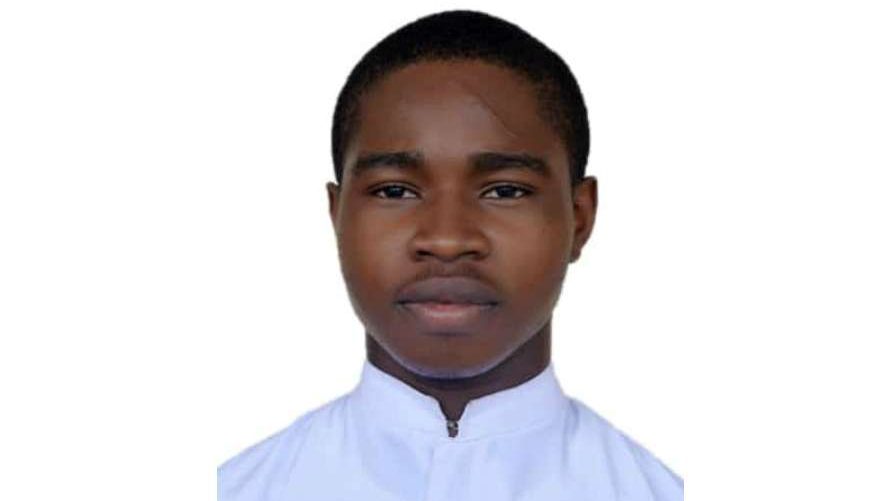A man claiming to have killed the murdered Nigerian seminarian Michael Nnadi has given an interview in which he says he executed the aspiring priest because he would not stop announcing the Christian faith in captivity.
Mustapha Mohammed, who is currently in jail, gave a telephone interview to the Nigerian newspaper Daily Sun on Friday. He took responsibility for the murder, according to the Daily Sun, because Nnadi, 18 years old, “continued preaching the gospel of Jesus Christ” to his captors.
According to the newspaper, Mustapha praised Nnadi’s “outstanding bravery,” and that the seminarian “told him to his face to change his evil ways or perish.”
Nnadi was kidnapped by gunmen from Good Shepherd Seminary in Kaduna on January 8, along with three other students. The seminary, home to some 270 seminarians, is located just off the Abuja-Kaduna-Zaria Express Way. According to AFP, the area is “notorious for criminal gangs kidnapping travelers for ransom.”
Mustapha, 26, identified himself as the leader of a 45-member gang that preyed along the highway. He gave the interview from a jail in Abuja, Nigeria, where he is in police custody.
On the evening of the abduction, gunmen, disguised in military camouflage, broke through the fence surrounding the seminarians' living quarters and opened fire. They stole laptops and phones before kidnapping the four young men.
Ten days after the abduction, one of the four seminarians was found on the side of a road, alive but seriously injured. On Jan. 31, an official at Good Shepherd Seminary announced that another two seminarians had been released, but that Nnadi remained missing and was presumed still in captivity.
On Feb. 1, Bishop Matthew Hassan Kukah of the Diocese of Sokoto, Nigeria, announced that Nnadi had been killed.
“With a very heavy heart, I wish to inform you that our dear son, Michael was murdered by the bandits on a date we cannot confirm,” the bishop said, confirming that the rector of the seminary had identified Nnadi’s body.
The newspaper reported that from “the first day Nnadi was kidnapped alongside three of his other colleagues, he did not allow [Mustapha] to have peace,” because he insisted on announcing the gospel to him.
According to the newspaper, Mustapha “did not like the confidence displayed by the young man and decided to send him to an early grave.”
According to the Daily Sun, Mustapha targeted the seminary knowing it was a center for training priests, and that a gang member who lived nearby had helped conduct surveillance ahead of the attack. Mohammed believed that it would be a profitable target for theft and ransom.
Mohammed also said that the gang used Nnadi’s mobile telephone to issue their ransom demands, asking for more than $250,000, later reduced to $25,000, to secure the release of the three surviving students, Pius Kanwai, 19; Peter Umenukor, 23; and Stephen Amos, 23.
Nnadi’s murder is one of an series of attacks and killings on Christians in the country in recent months.
Archbishop Ignatius Kaigama of Abuja called on Nigerian President Muhammadu Buhari to address the violence and kidnappings in a homily March 1 at a Mass with the Catholic Bishops’ Conference of Nigeria.
“We need to have access to our leaders; president, vice president. We need to work together to eradicate poverty, killings, bad governance and all sorts of challenges facing us as a nation,” Kaigama said.
In an Ash Wednesday letter to Nigerian Catholics, Archbishop Augustine Obiora Akubeze of Benin City called for Catholics to wear black in solidarity with victims and pray, in response to “repeated” executions of Christians by Boko Haram and “incessant” kidnappings “linked to the same groups.”
Other Christian villages have been attacked, farms set ablaze, vehicles carrying Christians attacked, men and women have been killed and kidnapped, and women have been taken as sex slaves and tortured—a “pattern,” he said, of targeting Christians.
On Feb. 27, U.S Ambassador at Large for Religious Freedom Sam Brownback told CNA that the situation in Nigeria was deteriorating.
“There's a lot of people getting killed in Nigeria, and we're afraid it is going to spread a great deal in that region,” he told CNA. “It is one that's really popped up on my radar screens -- in the last couple of years, but particularly this past year.”
“I think we’ve got to prod the [Nigerian President Muhammadu] Buhari government more. They can do more,” he said. “They’re not bringing these people to justice that are killing religious adherents. They don’t seem to have the sense of urgency to act.”

